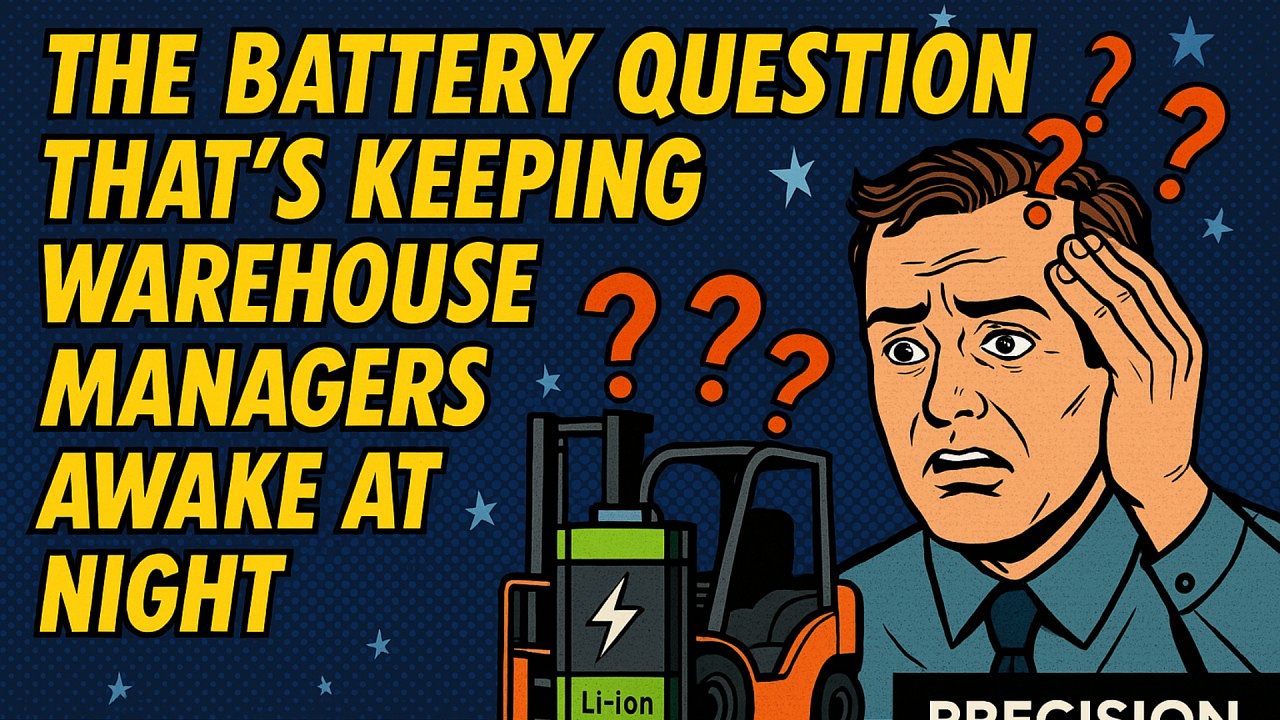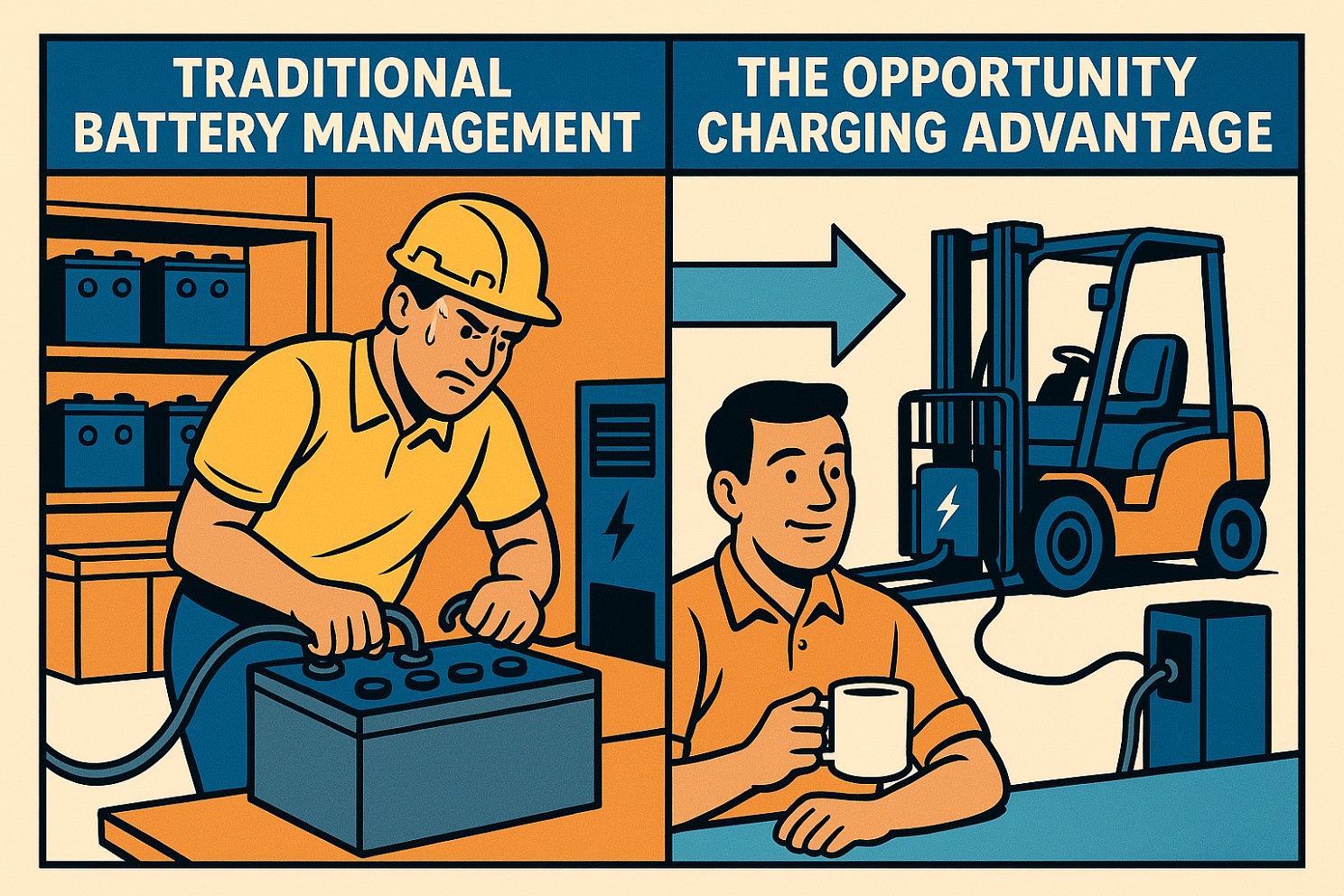
Why lithium-ion isn't the only consideration for your electric transition
Three warehouse managers called me this week with the same concern: "Robert, we're ready to go electric, but what happens when these expensive lithium-ion batteries fail?"
It's the right question, but it reveals a fundamental misunderstanding about modern electric forklift operations that could significantly impact your business.

The Old Battery Paradigm vs. The New Reality
Traditional thinking: Buy forklifts, buy batteries separately, manage battery rooms, schedule swaps, hope for a 5-year battery life.
Modern electric reality: Integrated power management systems, opportunity charging, predictive maintenance, and professional reconditioning that extends useful life far beyond original expectations.
Here's what changed the game: Lithium-ion batteries don't just replace lead-acid - they eliminate entire operational workflows.
The Hidden Operational Costs You're Already Paying
Most warehouse managers focus on battery purchase price while overlooking the operational overhead of traditional battery management:
- Labor costs for battery changing (8-12 minutes per swap, multiple times daily)
- Safety training and certification for battery handling procedures
- Infrastructure costs for battery rooms, ventilation, and charging areas
- Downtime losses during scheduled battery maintenance
- Space allocation for battery storage and charging stations
The opportunity charging advantage: Modern lithium-ion systems charge during regular break periods. No swaps, no battery rooms, no dedicated labor for power management.
What Professional Battery Management Delivers
Through our partnership with Precision Power Source here in Riverside, I've learned that battery "failure" is often preventable with proper management:
The 14-step professional reconditioning process:
- Visual inspection and cleaning with acid neutralization
- Individual cell resistance testing and repair
- Load testing and capacity analysis
- 72-hour deep sulfate crystal removal process
- Final quality control and performance verification
Real results: Batteries written off as "failed" often return to 85-95% original capacity through professional reconditioning, extending useful life by 2-3 years beyond expected replacement.
The Strategic Decision Framework
Question 1: What's your current total cost of power management? Include labor, infrastructure, safety training, and downtime. Most operations discover this exceeds $15,000-25,000 annually per forklift.
Question 2: How do you value operational simplicity? Opportunity charging eliminates scheduling complexity, reduces safety risks, and frees up floor space for productive use.
Question 3: What's your risk tolerance for battery supply chain disruptions? Professional reconditioning capabilities provide backup options when new battery lead times extend or prices spike.
The Local Partnership Advantage
Here's what we've learned working with Southern California warehouses: Battery performance depends more on management than technology.
The best lithium-ion battery poorly managed performs worse than older technology, professionally maintained. The integration between equipment, charging systems, and ongoing support determines your actual total cost of ownership.
Why local expertise matters:
- Immediate response for performance issues or optimization opportunities
- Predictive maintenance that prevents problems rather than reacting to failures
- Performance optimization based on your specific operational patterns
- Emergency support when you need it most
Making the Right Decision for Your Operation
The electric transition isn't just about buying different equipment - it's about adopting different operational philosophies that can dramatically improve efficiency and reduce costs.
Three principles for success:
- Think systems, not components: Battery performance integrates with charging infrastructure, operator training, and maintenance protocols
- Plan for optimization, not just replacement: Modern electric systems improve over time through data analysis and process refinement
- Partner for expertise, not just supply: Your transition success depends more on knowledge transfer than equipment delivery

The Real Question
Instead of asking "What happens when batteries fail?", the better question is: "How do I optimize our entire power management system for long-term competitive advantage?"
What's your experience been with electric transitions? I'm curious about the operational challenges you've encountered and how you've addressed them.
Questions about battery management or electric transitions?
Contact Precision Material Handling:
- Phone: (855) 377-1977
- Address: 268 W Lincoln St, Banning, CA 92220
- Website: precisionmaterialhandling.com
- Service: Same-day delivery available
Robert Ybarra is the CEO of Precision Material Handling and serves on the board of the San Gorgonio Pass Water District. He partners with Tailift, EP Equipment, and Precision Power Source to provide integrated electric forklift solutions throughout Southern California.
#BatteryTechnology #ElectricForklifts #OperationalOptimization #WarehouseEfficiency #PowerManagement
